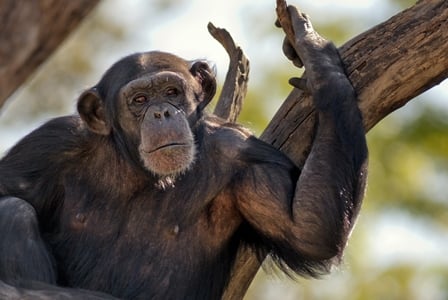
This Wildlife Wednesday, learn about the chimpanzee – our closest animal relative and a favourite of conservationist Jane Goodall.
Last week, I wrote about attending Jane Goodall’s inspiring lecture on how each of us can help preserve our planet’s flora and fauna. Not surprisingly, she spoke quite a bit about one animal in particular: the clever and lovable chimpanzee.
Habitat
Chimpanzees monkey around in the rainforest regions of 21 African countries.
Trivia
- Chimps and humans are practically cousins; only 2 to 5 percent of our DNA differs from chimps’!
- Just like us, these primates make and use tools for a variety of purposes.
- They’re also capable of learning human sign language.
- Cuteness alert! Chimps laugh when they play, and they’re even known to kiss, embrace, touch hands, and tickle each other as forms of humanlike communication.
- They form strong family bonds. Mothers and their young don’t spend any time apart until the baby chimps reach seven years old.
- Chimps spend each night cuddled in a nest of leaves and other forest materials. They never reuse the same nest.
- Infant chimps boast an adorable white tuft of a tail, though sadly this disappears after adolescence.
Why are they threatened?
Only about 150,000 to 250,000 chimps remain in the wild, affording them the dubious distinction of being an endangered species. Two main threats continue to trouble these playful primates: habitat loss and hunting for bushmeat.
Sadly, the forest regions of which chimps are so fond have been devastated by logging, mining, farming, and other land-developing projects. Chimps are often left with small, disconnected patches of rainforest that don’t offer much shelter or protection from hunting.
Bushmeat—meaning the meat of wild animals in Africa—has long been a source of protein for residents of Central and West Africa. Even if they’re not the intended target of a hunt, chimps may become entangled in snares meant for other animals.
How can we help?
Thanks in large part to the Jane Goodall Institute, chimps are a well-known and much-loved species. There are several ways we can help protect these smart, weirdly adorable apes.
- (Symbolically) adopt a chimpanzee from the World Wildlife Foundation and receive a (totally real) chimp plush and gift bag.
- Contribute to the Jane Goodall Institute of Canada, whether this means donating money or becoming a Chimp Guardian.
- Learn more about chimpanzees and current conservation efforts.



